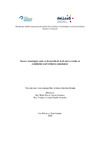Identificador persistente para citar o vincular este elemento:
https://accedacris.ulpgc.es/jspui/handle/10553/75538
| Título: | Nuevas tecnologías para el desarrollo de la destreza escrita en estudiantes universitarios jamaicanos | Autores/as: | González Boluda, Mariana | Director/a : | Cáceres Lorenzo, M. Teresa Trujillo González, Verónica Cristina |
Clasificación UNESCO: | 5701 Lingüística aplicada 570111 Enseñanza de lenguas |
Fecha de publicación: | 2020 | Resumen: | The purpose of this doctoral thesis is to explore the development of writing skills among multilingual Jamaican university students (Patois-English-Spanish) using Web 2.0 tools. The research for the thesis involved a total of 269 participants, including 259 students and 10 teachers, during the academic years from 2013 to 2015. It sought to combine quantitative and qualitative methods and examine three general questions that served to focus our attention on the unique aspects of language acquisition among Jamaican university students. In the preliminary diagnostic phase, we asked 100 students and 10 teachers how they engaged in autonomous work and their use of Web 2.0 tools. We also asked 34 students how linguistic attitudes were embedded in these learning situations. In the second phase, we analyzed linguistic errors in 75 writing samples coming from three different language levels during the academic year 2013-2014. We sought to ascertain the main difficulties Jamaican teachers and students encountered when writing and expressing themselves in L3, in this case Spanish. We observed from their writing samples that agreement errors were common among Jamaican university students, and we made these our objects of study. Based on our findings, in the third phase we crafted and implemented a pedagogy that incorporated Web 2.0 tools like Facebook and blogs to improve students’ writing, encourage them to work autonomously, and be self-motivated. This study sought to advance third language acquisition research and error analysis. While most of the research in these areas has been carried out in classroom settings, our research compared two types of error analysis not only in formal contexts but also in informal contexts in a digital environment (including 50 writing samples on Facebook and blogs from the 2014-2015 academic year). The results show that there were fewer grammatical errors in the digital samples, although the orthographic errors were greater and with a similar percentage in the total number of lexical errors. In addition, we found that the groups involved in this pedagogical project were more cohesive and felt more comfortable in these dynamic virtual environments. They also created an online community of learners who interacted in the target language, promoting motivation in informal learning environments. Finally, we recommend that more research attention be given to investigate the influence of sociolinguistic and psycholinguistic factors in third language acquisition. We believe that students can benefit from their multilingual knowledge and become more aware of the different strategies they have acquired in the process of language acquisition in order to enhance their writing skills in L3. | Descripción: | DELLCOS. Doctorado en Estudios Lingüísticos y Literarios en sus Contextos Socioculturales | URI: | https://accedacris.ulpgc.es/handle/10553/75538 |
| Colección: | Tesis doctoral |
Visitas 5
253
actualizado el 10-ene-2026
Descargas
506
actualizado el 10-ene-2026
Google ScholarTM
Verifica
Comparte
Exporta metadatos
Los elementos en ULPGC accedaCRIS están protegidos por derechos de autor con todos los derechos reservados, a menos que se indique lo contrario.
